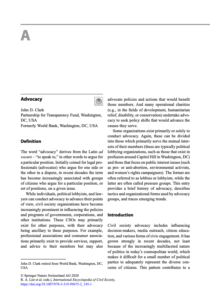Civil society advocacy includes influencing decision-makers, media outreach, citizen education, and various forms of civic engagement. It has grown strongly in recent decades, not least because of the increasingly multifaceted nature of politics in today’s cosmopolitan world, which makes it difficult for a small number of political parties to adequately represent the diverse concerns of citizens. This pattern contributes to a clear shift from representative to participatory democracy – with a profusion of cause-focused pressure groups and the relative decline in membership of, and respect for, political parties in most democracies. The civil society organizations (CSOs) and networks that result have a variety of forms, largely reflecting the degree of formality of their alliances.
Given that the policy issues of popular concern are often global in nature, the rise of transnational civil society – uniting people who share common concerns everywhere – is one of the most important developments, and CSOs have been more adept at shifting to working globally than have conventional instruments of democracy: political parties and independent media. This, however, presents CSOs considerable challenges concerning their organizational and governance arrangements, and there are clear limitations; CSOs represent those who agree with their particular cause, not the general public; they must recognize that their advocacy is a complement to, not substitute for, traditional party-based democracy.
This entry explores these issues – the reshaping of democracy as citizens’ concerns become increasingly global in nature and as traditional political parties are no longer the natural home for the issues people care about – after providing a brief history of advocacy; summarizing the tactics used by civil society; and describing the organizational forms that are typically found.
It finishes by setting out three important emerging trends: (a) an increasing focus on “how” rather than “what” in CSO advocacy, with attention broadening from policies (whether governmental or corporate) to questions of governance, accountability, and inclusion; (b) the rapid diversification of approaches and organizational forms as the political landscape changes and modern information and communication technologies (ICT) open new avenues; and (c) the backlash against CSOs as their advocacy becomes more influential.


